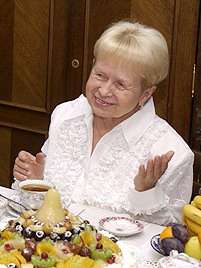Aleksandra Pakhmutova
Aleksandra Nikolayevna Pakhmutova (Russian: Александра Николаевна Пахмутова; born 9 November 1929) is a Soviet and Russian composer. She has remained one of the best known figures in Soviet and later Russian popular music since she first achieved fame in her homeland in the 1960s. People's Artist of the USSR (1984).
Aleksandra Pakhmutova Александра Пахмутова | |
|---|---|
 | |
| Born | Aleksandra Nikolayevna Pakhmutova 9 November 1929 Stalingrad, Russian SFSR, Soviet Union |
| Alma mater | Moscow Conservatory |
| Occupation | Composer |
| Years active | 1958–present |
| Title | Hero of Socialist Labour (1990) People's Artist of the USSR (1984) |
| Awards |
|
She was born on 9 November 1929 in Beketovka (now a neighbourhood in Volgograd), Russian SFSR, Soviet Union, and began playing the piano and composing music at an early age. She was admitted to the prestigious Moscow Conservatory and graduated in 1953. In 1956 she completed a post-graduate course led by the outstanding composer Vissarion Shebalin.
Her career is notable for her success in a range of different genres. She has composed pieces for the symphony orchestra (The Russian Suite, the concerto for the trumpet and the orchestra, the Youth Overture, the concerto for the orchestra); the ballet Illumination; music for children (cantatas, a series of choir pieces, and numerous songs); and songs and music for over a dozen different movies from Out of This World in 1958 to Because of Mama in 2001.
She is best known for some of her 400 songs, including such enduringly popular songs as The Melody, Russian Waltz, Tenderness, Hope, The Old Maple Tree, The Song of the Perturbed Youth, a series of the Gagarin Constellation, The Bird of Happiness (from the 1981 film O Sport, You – the world!, whose the song is subsequently very known in both Russia and China when performed by Russian singer Vitas since 2003) and Good-Bye Moscow which was used as the farewell tune of the 22nd Olympic Games in Moscow in 1980. Tenderness was used with great effect in Tatyana Lioznova's 1967 film Three Poplars on Plutschikha. Her husband, the eminent Soviet era poet Nikolai Dobronravov, contributed lyrics to her music on occasion, including songs used in three films.
One of her most famous ballads is Belovezhskaya Pushcha, composed in 1975, which celebrates Bialowieza Primaeval Forest, a last remnant of the European wildwood split now between Poland and Belarus. Another much-aired song was Malaya Zemlya, about a minor outpost where the then Soviet leader Leonid Brezhnev served as a political commissar during World War II.
Alexandra Pakhmutova found favour with the state establishment as well as the public. Reputedly Brezhnev's favourite composer, she received several Government Awards and State Prizes and served as the Secretary of the USSR and Russian Unions of Composers. She was named Hero of Socialist Labour in 1990. Her name was given to Asteroid # 1889, registered by the planetary centre in Cincinnati, Ohio, United States.
Popular Songs
- "Надежда" "Nadezhda"
- "Песня о тревожной молодости" "Pesnya o Trevozhnoy Molodosty"
- "Melodia" ("Мелодия")
- "Беловежская пуща" "Belovejskaya Pusha"
- "Nezhnost'" ("Нежность")
- "Komanda molodosti nashey" ("Команда молодости нашей")
- "Starii Klen" ("Старый клён")
- "Как молоды мы были" "Kak molody my byli"
- No Coward Plays Hockey ("Трус не играет в хоккей")
- "And The Battle Is Going Again" "И вновь продолжается бой"
Honours and awards
- Soviet and Russian
- Hero of Socialist Labour (29 October 1990) – for outstanding contributions to the development of Soviet musical art and productive social activities
- Two Orders of Lenin (6 November 1979 and 29 October 1990)
- Order of St. Andrew (28 October 2019)
- Order for Merit to the Fatherland;
- 1st class (9 November 2009) – for outstanding contribution to the development of national musical art, and many years of creative activity
- 2nd class (27 December 1999) – for great personal contribution to the development of musical art
- 3rd class (29 September 2014) – for great contribution to the development of domestic musical art and achieved creative success
- Order of the Red Banner of Labour, twice (1967, 1971)
- Order of Friendship of Peoples (1986)
- State Prize of the Russian Federation (12 June 2015)
- USSR State Prize (1975) – for the songs of recent years (1971–1974)
- USSR State Prize (1982) – for the music for the film "O Sport, You – the world" (1981)
- Lenin Komsomol Prize (1966) – a song cycle about youth and the Komsomol Prize of the Union State of Russia and Belarus for literary and artistic works that make a significant contribution to strengthening the relations of brotherhood, friendship and comprehensive cooperation between the countries – members of the Union State (10 March 2004)
- Honoured Artist of the RSFSR (1971)
- People's Artist of the RSFSR (1977)
- People's Artist of the USSR (1984)
- Honorary Citizen of Volgograd (19 October 1993)
- Honorary Citizen of Bratsk (26 August 1994)
- Honorary citizen of Moscow (13 September 2000)
- Foreign
- Order of Francisc Skorina (Belarus, 3 April 2000) – for outstanding work on the development and strengthening of the Belarusian-Russian cultural relations
- Public
- Order of St. Euphrosyne, Grand Duchess of Moscow, 2nd class (Russian Orthodox Church, 2008)
- The title "Living Legend" by the national Russian award "Ovation" (2002)
- The award "Russian National Olympus" (2004)
| Awards | ||
|---|---|---|
| Ovation | ||
| Preceded by 2001 Igor Moiseyev |
Living Legend Award 2002 Aleksandra Pakhmutova |
Succeeded by |
External links and references
| Wikimedia Commons has media related to Aleksandra Nikolayevna Pakhmutova. |
- Official website (in Russian)
- Aleksandra Pakhmutova discography at Discogs (in Russian)